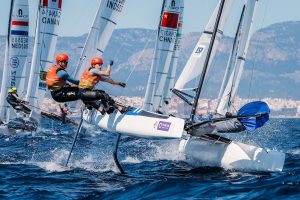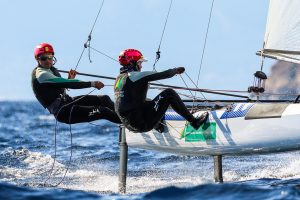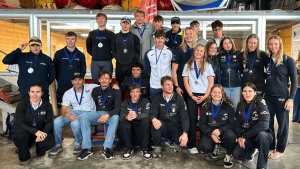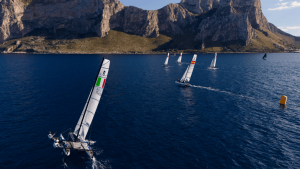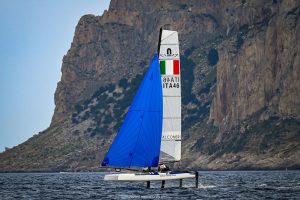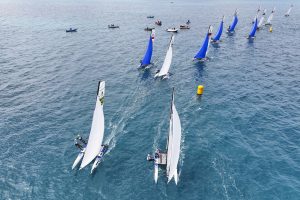The World Sailing Equipment Committee requested that Nacra 17 investigate an evolution to full foiling looking toward the 2020 games in Tokyo. The current edition of the boat has lifting C foils that teams can occasionally make balance to give it full lifting from the water, but in an unstable manner.
Unluckily, the initial briefs that ultimately delivered the Nacra 17 into the Olympic fold came 6-9 months before cats in the AC showed it possible to fully foil. Prior to that there had only been marginally successful attempts in boats like the C-class. The very modern Nacra 17 class looked a bit outdated as it hit the water, and with so many full foiling boats around it has been a desire to see if the Nacra 17 can be updated.
Merrelli and Melvin were assigned as the designers and along with lead builder Peter Vink this project is now 12 months in. Along with a change to the rudder and centerboard has come a host of structural upgrades to the Nacra 17, a daggerboard case moved forward about 4 inches, and a shorter spin pole and genneaker anticipating much higher downwind speeds.
Two boats are being tested currently in the Netherlands, less than 2 weeks into the process. One boat is a modified mk1 boat, with C foils and a daggerboard location moved forward. The other boat is a mk2 with Z foils and T rudders. Both boats are being tested daily by top sailors from the Nacra 17 class, with support from the Nacra factory rib. It is early days so without big picture comment we’ll just share a few vids from testing, each showing a glimmer of features one would hope the new boat has.
a) First Day Sailing – near foiling gybe – Olivia and Micah from NZL
b) Stable downwind foiling – Moana and Manon from FRA
c) Stable upwind foiling – Tom and Nicola from GBR
d) mk1 vs mk2 – Upwing
e) Tom and Nicola give feedback from first sail
Words of caution. These video clips represent just snippets from 2 weeks of sailing, there is obviously much more to do. It is early days and there are only a few data points so far. We will continue to have more teams come and test the boats, to get more views, to further test durability, suitability, fun factor, and many more things that go into a successful Olympic event.

